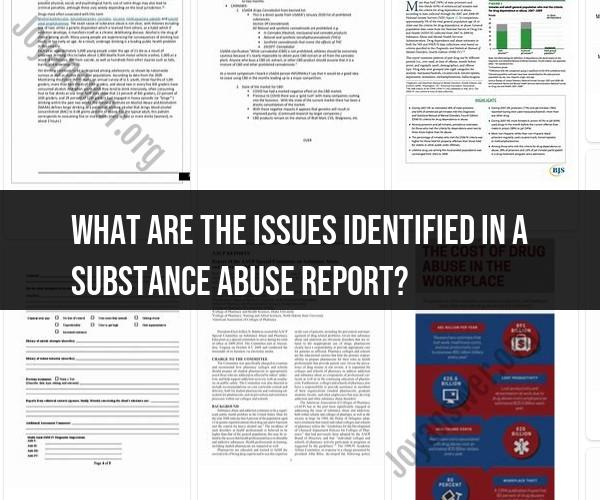What are the issues identified in a substance abuse report?
A substance abuse report aims to provide a comprehensive overview of the issues related to substance abuse within a specific context or population. The issues identified in such a report can vary depending on the focus, scope, and purpose of the report. However, common issues that are typically addressed in a substance abuse report include:
Prevalence of Substance Abuse:
- The report often starts by outlining the prevalence and scope of substance abuse within a given population, region, or demographic group. This includes statistics on the use of specific substances (e.g., alcohol, drugs) and trends over time.
Impact on Public Health:
- Substance abuse can have profound public health implications. The report may discuss the impact on physical and mental health, including the incidence of addiction, overdose deaths, and the spread of diseases like HIV and Hepatitis C through intravenous drug use.
Social and Economic Consequences:
- Substance abuse can lead to a range of social and economic consequences. The report may address issues such as reduced productivity, increased healthcare costs, family disruptions, domestic violence, and child neglect or abuse associated with substance abuse.
Demographic Disparities:
- Different demographic groups may be disproportionately affected by substance abuse. The report may highlight disparities in substance abuse rates, access to treatment, and outcomes among various populations (e.g., age, gender, race/ethnicity, socioeconomic status).
Substances of Abuse:
- The report typically identifies and discusses specific substances commonly abused in the studied population or region. This may include alcohol, tobacco, prescription medications, illicit drugs (e.g., opioids, cocaine, methamphetamine), or newer synthetic substances.
Treatment and Rehabilitation Services:
- Access to treatment and rehabilitation services is a critical issue. The report may assess the availability, affordability, and effectiveness of substance abuse treatment programs, including detoxification, counseling, medication-assisted treatment, and recovery support services.
Prevention Efforts:
- Prevention strategies are essential for reducing substance abuse. The report may evaluate existing prevention programs and campaigns aimed at reducing the initiation of substance use among youth and promoting healthy behaviors.
Legislation and Policy:
- Legal and policy frameworks play a significant role in addressing substance abuse. The report may analyze current laws, regulations, and policies related to substance abuse prevention, treatment, harm reduction, and enforcement.
Stigma and Barriers to Treatment:
- Stigma surrounding substance abuse can hinder individuals from seeking help. The report may discuss efforts to reduce stigma and identify barriers to accessing treatment services, such as fear of legal consequences or discrimination.
Harm Reduction Strategies:
- Harm reduction approaches, such as needle exchange programs and supervised injection sites, may be discussed as strategies to mitigate the adverse consequences of substance abuse.
Emerging Trends and Challenges:
- The report may address emerging trends in substance abuse, including the use of new psychoactive substances, changes in drug trafficking patterns, and evolving treatment modalities.
Recommendations and Solutions:
- Based on the issues identified, the report often concludes with recommendations for addressing substance abuse, improving treatment and prevention efforts, and implementing policy changes.
Data and Research Gaps:
- Identifying gaps in data and research is important for informing future initiatives. The report may highlight areas where additional research is needed to better understand substance abuse issues.
Ultimately, a substance abuse report serves as a resource for policymakers, healthcare providers, educators, and community stakeholders to develop evidence-based strategies for prevention, treatment, and harm reduction. It provides a comprehensive overview of the multifaceted challenges associated with substance abuse and informs efforts to mitigate its impact on individuals and communities.












